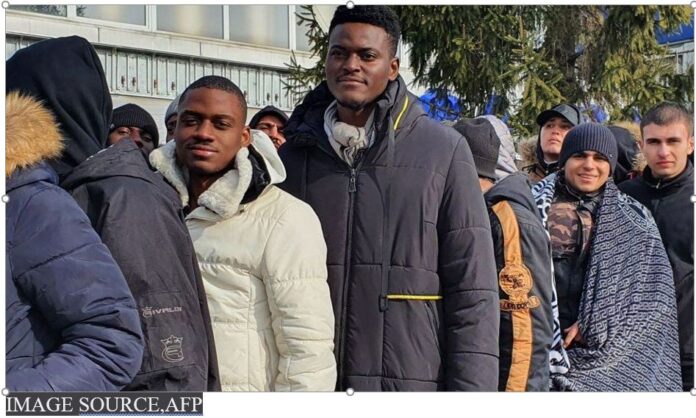Ukrainian lure begins with education then a better life
By Jeph Ajobaju, Chief Copy Editor
Nigeria began evacuation of its 5,000 citizens from Ukraine last February and by Sundayabout 1,000 had been airlifted via Romania, Poland, and Hungary funded from a $8.5 million budget, out of which $100 will also be given to each evacuee.
Many of them were students in Ukraine. Some had graduated, married Ukrainians and settled down to a bright future until Russia invaded its south western neighbour unprovoked on 24 February.
Foreign Affairs Minister Geoffrey Onyeama said there were about 5,600 Nigerian students and an estimated 8,000 other Nigerian citizens in Ukraine before the war.
More than 1.5 million Ukrainians and foreigners have fled Ukraine since the invasion, with the United Nation warning that “at this rate” the exodus could become “the biggest refugee crisis this century.”
Going back to Nigeria is not an option
However, many Nigerians said they have a better life in Ukraine and do not want to return to their home country. Those who returned were literally forced to do so.
“I’m going to stay here and see if the situation improves. Going back to Nigeria is not an option,” Desmond Muokwudo tells the BBC.
“I will seek for student permit and continue my life from here,” Lukman Ibrahim, a student and artist who was able to flee Ukraine into Poland, tells Channels Television. “Because home is not safe, everybody knows this.”
Pressed on what he meant by ‘not safe’, Ibrahim, who studied at the International European University in Kyiv before the invasion, alluded to the fuel scarcity that has been ravaging Nigeria for four weeks.
“You now expect me to come home and face the same thing when I just survived a war? I will never do that,” he said.
Emeka Nnamdi, who is stuck in Sumy, Ukraine, prefers to come back home, but only for a short while.
“I am currently doing my Masters here,” Nnamdi said.
“I finished my six years of medical school here. And I am doing a specialty course, which will take me three years. But if I’m doing a specialty course in Nigeria, it will take me more than five years, if not seven years. So why should I come home?”
________________________________________________________________
Related articles:
Nigerian evacuees from Ukraine laud FG as they depart Poland
EXCLUSIVE: What am I coming back to Nigeria to do, asks 32-year-old Nnamdi Okafor in Ukraine
AUN offers Nigerians fleeing Ukraine admission space
Russia’s war with Ukraine threatens Nigeria’s $2b trade
_________________________________________________________________
What will happen after I arrive Nigeria on a free flight?
“What am I coming back to Nigeria to do? Has anything changed in our country?” Nnamdi Okafor he wondered in an interview with TheNiche.
“For now, I am still in Ukraine. I used to live in the capital city, Kyiv, but I have moved to one of the border towns which is relatively safe presently.
“But if the war reaches there, I will escape to another country by the grace of God. But if death becomes my destiny, so be it. I would rather here a refugee than return to Nigeria.”
Why he will not take advantage of the Nigerian government’s free evacuation and return home? TheNiche asked.
“My brother, the question you should have asked is why I left Nigeria in the first place. I came to Ukraine two years ago.
“Before I did, I had stayed in Nigeria for five years after my Youth Service without a job. My country psychologically abused me. I was frustrated and miserable. I almost lost hope in life. I was depressed.
“But it took me only two months to secure a good job when I came to Ukraine in early 2020. If not for this senseless war, life was beginning to have meaning for me once again.
“So, if I hop into the plane because I have seen a free flight, what happens after I come down in Abuja or Lagos or wherever? Has anything changed in Nigeria? Will I now get the job, lack of which forced me out?
“I am not coming back. This war will end one day. But if it doesn’t, we will decide what next to do. But coming back to Nigeria is out of it for now. And mind you, I am not the only one staying put.
“The students who were sent here by their rich parents to study may go home, but I doubt if any economic migrant like me will dare do that.”
So what, in the first placed, lured them to Ukraine whose language they did not speak originally and had to learn from scratch? And why would they want to stay put despite the different social values and pockets of discrimination, even racism?
Student numbers
The BBC reports below what drew Nigerians, other Africans, and Indians to the East European country and why some find life so fulfilling they choose to remain:
The Russian invasion of Ukraine has caused a mass exodus of civilians, including thousands of international students from Africa, Asia and the Middle East.
Ukraine was home to over 76,000 foreign students, according to government data from 2020.
Nearly a quarter of the students were from Africa, with the largest numbers coming from Nigeria, Morocco and Egypt.
India easily accounts for the highest portion with over 20,000 students.
The students – studying medicine, engineering and business – are an important part of the country’s economy.
But, as Russia launches the biggest European invasion since the Second World War, thousands of them have fled, hundreds are still trapped, and many remain uncertain about the fate of their education.
Attraction of Ukraine
Ukraine has long appealed to foreign students, which can be traced back to the Soviet era, when there was a lot of investment in higher education and a deliberate attempt to attract students from newly independent African countries.
Now, Ukrainian universities are seen as a gateway to the European job market, offering affordable course prices, straightforward visa terms and the possibility of permanent residency.
“Ukrainian degrees are widely recognised and offer a high standard of education,” said Patrick Esugunum, who works for an organisation that assists West African students wanting to study in Ukraine.
“A lot of medical students, in particular, want to go there as they have a good standard for medical facilities,” he added.
Desmond Chinaza Muokwudo, a Nigerian student who had been based in the city of Dnipro, said he was attracted by the relaxed admission requirements and the cheap cost of living compared to other European cities.
He enrolled at the University of Customs and Finance less than three months ago.
Many courses are offered in English, but the 30-year-old was undertaking a preliminary Ukrainian language course, before moving on to study international relations.
“I was a welder back in Nigeria and I needed an education to accomplish things,” he told the BBC from a hostel in Poland after fleeing the conflict.
“Ukraine was the best option for me.”
Where the students now
Like Muokwudo, more than 10,000 other African students have managed to flee the conflict and enter neighbouring countries, according to the EU.
There have been reports of foreign students receiving racist treatment at the border, with social media footage showing Ukrainian officials preventing some from crossing.
Hundreds of students are still believed to be in Ukraine, but it is hard to confirm exact numbers.
One Indian student was killed when he ventured outside to buy some food.
Christophe, a 22-year-old Cameroonian student, spoke to the BBC from inside a basement in the southern city of Kherson, which has been taken by Russian forces.
“We are not going outside because we are scared.”
He said that he and more than 20 fellow students had spent the past week in a basement with no light, listening to the sound of shelling and gun shots.
“It’s like a dead city, there’s no-one outside at all.”
He said he had not seen any sign of African people being harassed during the conflict but he thought to wise to stay inside.
“It’s the most safe thing to do right now, we don’t want to put ourselves in danger.”
The international business student was one year into his bachelor’s degree at the Kherson National Technical University when the fighting began.
“It’s difficult to imagine finishing your studies in this sort of environment,” he said.
In another part of the city, Mamady Doumbouya, a computer science student from Guinea, said: “I want to go back to my country, we can’t study in war.”
He spoke to the BBC from inside a dark basement surrounded by his classmates from Gabon, Senegal, and Cameroon.
“We don’t have water, we don’t have light,” he said.
What governments doing to help
Ukraine halted all civilian flights when the invasion began on 24 February.
African governments have been scrambling to evacuate their citizens from the country, with some organising flights back home to those who make it across the border.
Ghana was the first African nation to welcome home a group of students on 1 March.
Speaking to the BBC after landing in the capital, Accra, student Jared Otumfuo Catey said: “A few days ago, I didn’t know I’d be here right now. I’m feeling grateful that I made it through and I’m safe.”
Nigeria said it would follow suit and offer flights for those wishing to return via Romania, Hungary, and Poland.
South Africa’s ambassador to the Ukraine told the BBC that he had to leave Ukraine for his own safety but that he had been working hard to secure the exit of South Africans and other foreigners from the country.
South Africa’s ambassadors in both Poland and Hungary have also gone to the borders to help people get through, he said.
The Ukrainian government has launched an emergency hotline for Africans and Asians fleeing, according to the foreign minister.
In a tweet, Dmytro Kuleba said the authorities were “working intensively” to ensure the safety and passage of African and Asian students.
Will they be able to finish their studies?
Having invested a lot of money in an education in Ukraine, many students have told the BBC that they were torn between returning home or staying in Europe to complete their degrees.
Jessica Orakpo, a sixth-year medical student at the Ternopil National Medical University, was four months away from graduating when the Russian troops invaded.
“I’m stuck now, I can’t move forward with my education because my school has all my documents,” she told the BBC on her way to the Hungarian capital, Budapest.
“I don’t have time to start all over again and I just want my degree. Maybe I can finish my master’s somewhere else.”
Foreign students in Ukraine get temporary residence for the duration of their studies, but this does not extend to neighbouring countries.
Muokwudo said he would try to finish his course elsewhere in Europe, if all else fails.
“I’m going to stay here and see if the situation improves,” he said.
“Going back to Nigeria is not an option.”







